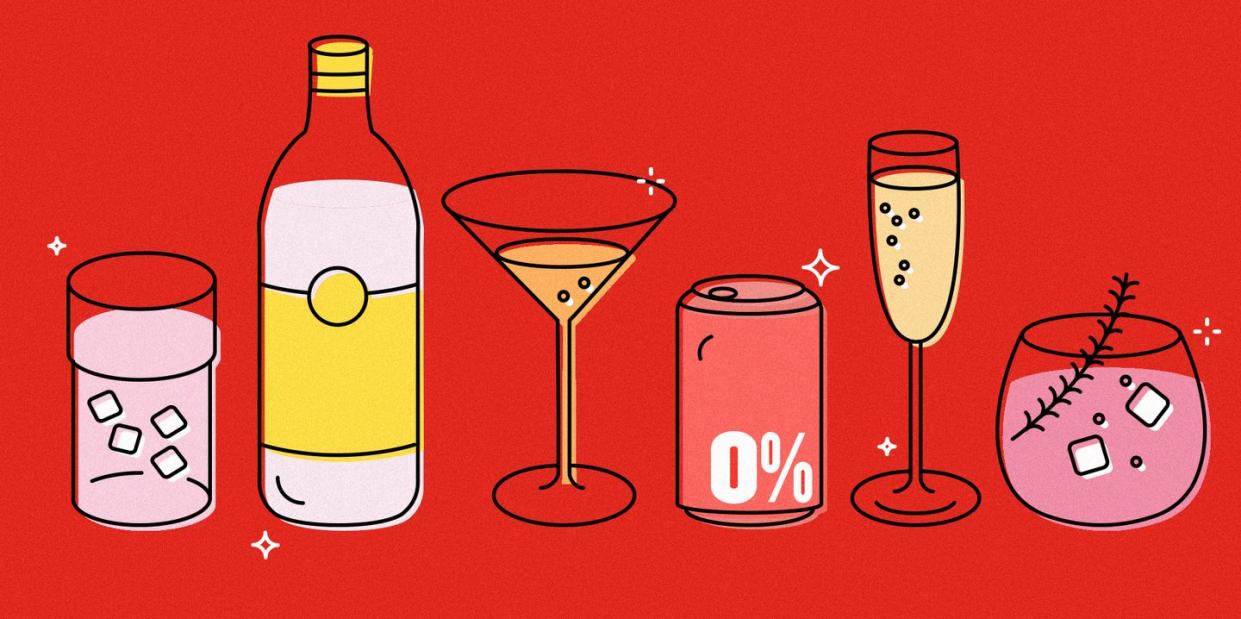Why More And More People Are Giving Up Alcohol—For Good

"Hearst Magazines and Yahoo may earn commission or revenue on some items through the links below."
If you’re anything like me, you’re halfway through Dry January longing for February 1. After two weeks of no drinking (with a slip up here and there, if we are being honest), I have to say giving up alcohol has been hard. The most difficult parts have been going out with friends and being around others who drink. But I can’t deny the benefits I’ve felt. Not wasting my precious weekend days to hangovers or dealing with the dreaded hangxiety has been amazing.
All that got me thinking, what is it like for people who don’t just do a dry January, but live a dry life. After a conversation with Brett Phillips for another article, who talked about sober curious-ness, I got curious myself. The sober curious movement, so to speak, is when someone chooses to be sober for the health benefits, both physical and mental, as opposed to someone who is sober because of an alcohol abuse problem. In other words, people who are sober curious don’t consider themselves alcoholics, but still choose not to drink.
Hope Woodard is one of those people. The Brooklyn-based TikTok creator and social media strategist stopped drinking three months ago after getting into a fight with her roommate she realized would never have happened if she hadn't been drinking.
“Drinking just causes so much chaos, in my opinion, and I think it's so easy to laugh it off,” she says. “I thought, ‘I'm tired of making this like a light-hearted thing.’”
Throughout this time, she has shared her experience with her 100,000 followers, explaining that she didn’t necessarily consider herself in recovery. Her drinking didn’t get “out of hand all the time,” but the times that did get “out of hand weren’t worth it.”
“I was tired of wasting time being hungover,” she shares in one TikTok. “And I definitely was reliant on alcohol in social situations. Instead of dealing with my anxiety, I would just drink away my anxiety…and I would wake up the next day having more anxiety.”
Hope isn’t alone in this. More and more people are giving up alcohol, not because they identify as an alcoholic, but because the benefits of living sober outweigh the downsides. “During the pandemic there was a huge increase in how much people were drinking,” Amanda E. White, a Licensed Professional Counselor and author of Not Drinking Tonight, says. “I believe more people than ever are realizing they may need to re-evaluate their relationship with alcohol.”
For anybody who dates or has a social life, giving up alcohol can seem near impossible. “Most of your social life revolves around getting f*cked up, and giving up alcohol, it's like you get to relearn how to just hang with people because you actually like them,” Hope says. “The chaos that's caused by drinking, you don't really have that as a distraction anymore. Any problem in your life, you are in charge of it.”
In the 90-plus days Hope has not been drinking, she noticed that sweets are a lot sweeter. “It’s like the saturation has turned up 20 percent,” she says. And the rich moments of life, as she refers to them, are less common, but more enjoyable. “When you get drunk, life so naturally feels rich. When you're sober, you kind of have to work for those experiences, right? It’s like having a really good bowl of ice cream, going on a euphoric run, or going dancing. I’m finding these experiences feel so real.”
All this isn’t to say that giving up drinking is something everyone should do, but it is something most of us are never given the opportunity to even consider, Amanda says. “Society never really talks about it. Only alcoholics quit drinking. There are so many mental health benefits and physical benefits to taking a break. Even more importantly, it’s hard to know how much you are using alcohol as a social lubricant or to deal with stress without taking a break.”
You Might Also Like

